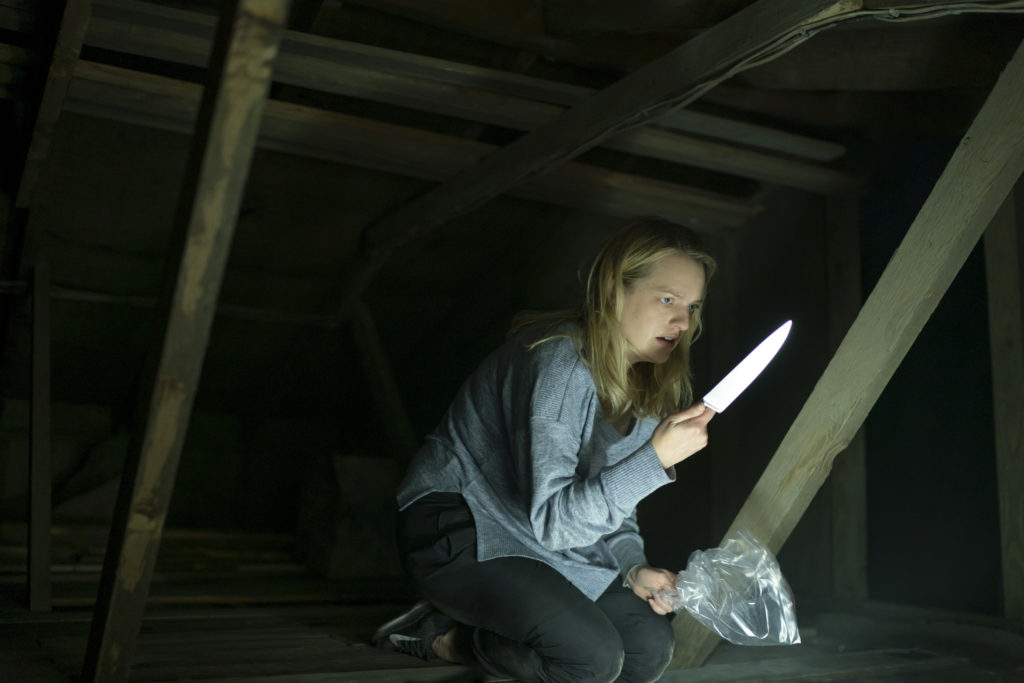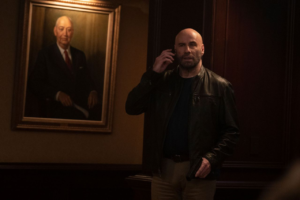Universal Pictures and Blumhouse Productions give an H.G. Wells classic a contemporary spin in The Invisible Man from director Leigh Whannell. The Invisible Man opens with Cecilia Kass (Elisabeth Moss) escaping the abusive clutches of her controlling boyfriend, Adrian Griffin (Oliver Jackson-Cohen).
Following the advice of her sister Emily (Harriet Dyer), Cecilia decides to stay with her childhood friend James (Aldis Hodge) and his daughter Sydney (Storm Reid). Before long, Adrian takes his own life, and Cecilia is informed by Adrian’s lawyer and brother, Tom (Michael Dorman), that Adrian left her his fortune.
Initially over the moon, Cecilia’s happiness is short-lived as strange and spooky occurrences from an unseen force soon turn violent. Cecilia realizes that Adrian may have faked his death, and is hell-bent on revenge. With no one believing her stories about Adrian’s superior intellect and new found invisibility, Cecilia realizes that she not only has to prove Adrian is alive but stop him before he hurts those she loves.
H.G. Wells’ character, “The Invisible Man”, has had numerous versions since his initial creation in 1897. Some of the results were great (2000’s Hollow Man) while others (1988’s The Invisible Kid) were laughably bad. Thankfully writer-director Leigh Whannel’s modernized take on the material is a well-crafted suspense film, driven by the terrific Elizabeth Moss.
One of the things I commend scriptwriter Leigh Whannell for establishing with Cecilia’s arc is that the moment we meet the character, she’s a broken and terrified woman. Cecilia’s eyes and silence solidify the terror she experienced while living with Adrian. It’s a testament to Moss’s strength as an actress that I generally felt emotion for her character. Once the film kicks into high gear, the fun starts. There are physical moments where Moss must act terrified, show off her athleticism as she is thrown around, but is also quick to get up and continue the fight.
None of those mentioned above scenes never come off as comical as Whannell purposely creates a slow narrative. There’s one moment in the film (which I won’t spoil here) that will catch audiences off guard and is worth the price of admission alone. With his third film, Whannell has come a long way as a director, and I look forward to what he has up his sleeve for the future. Whannel’s wise decision to avoid jump scares and gore is a rarity in today’s horror films.
Regarding the supporting cast in the film, Oliver Jackson-Cohen was a great choice as our primary villain. While we never see the physical form of Oliver Jackson-Cohen’s attacking Cecilia, the mental fear he puts in our minds comes back full fold during the so-called invisible scenes. It also helps that Oliver Jackson-Cohen is a somewhat unknown actor, as a more known name may have hurt the overall tone of the film. Storm Reid, Aldis Hodge, and Harriet Dyer were also great as Cecilia’s support system.
Each character wants to help Cecilia, and the moments in which they don’t believe her come off as genuine as opposed to forced. I enjoyed seeing Aldis Hodge on screen as our male hero, and I’m still hoping he gets an action franchise one day. Similar to most horror films, the primary issue with The Invisible Man is the marketing campaign. Some of the movie’s best moments were ruined for me as I had already seen them in the trailer.
Relying on suspense and the fear of what you can see, Leigh Whannel’s remake of The Invisible Man is a success. With another excellent performance from Elisabeth Moss and some significant effects, Universal’s and Blumhouse’s take on the H.G. Wells classic is one of the best remakes in recent memory.
Final Grade A-






